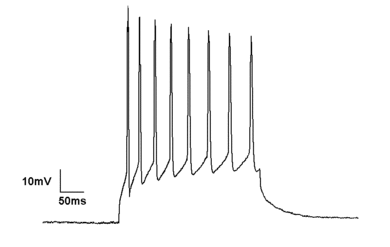Electrophysiology (from Greek ἥλεκτ, ēlektron, "amber" [see the etymology of "electron"]; φύσις, physis, "nature, origin"; and -λογία, -logia) is the branch of physiology that studies the electrical properties of biological cells and tissues. It involves measurements of voltage changes or electric current or manipulations on a wide variety of scales from single ion channel proteins to whole organs like the heart. In neuroscience, it includes measurements of the electrical activity of neurons, and, in particular, action potential activity. Recordings of large-scale electric signals from the nervous system, such as electroencephalography, may also be referred to as electrophysiological recordings.[1] They are useful for electrodiagnosis and monitoring.

- ^ Scanziani, Massimo; Häusser, Michael (2009). "Electrophysiology in the age of light". Nature. 461 (7266): 930–39. Bibcode:2009Natur.461..930S. doi:10.1038/nature08540. PMID 19829373. S2CID 205218803.